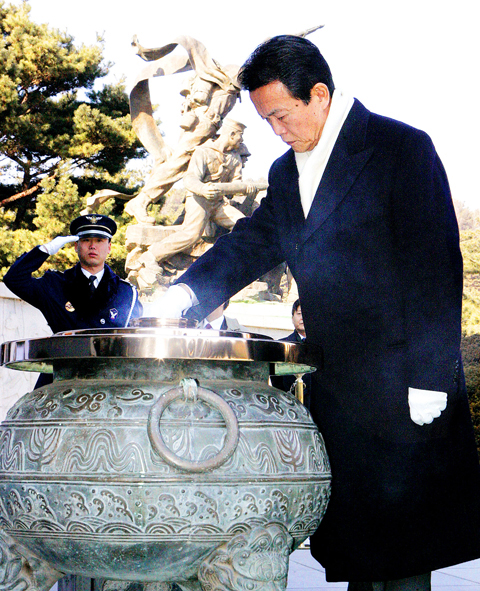Japanese Prime Minister Taro Aso arrived in South Korea yesterday for a visit aimed at discussing the global financial crisis, with Afghanistan and North Korea also high on the agenda.
Making his first visit to Seoul since becoming prime minister, Aso will hold talks with South Korean President Lee Myung-bak today in which they are expected to discuss the deadlocked negotiations over North Korea’s nuclear weapons drive.
The two leaders will also discuss cooperation in Afghanistan, where the Asian economic powers are both looking at expanding reconstruction aid, the Japanese foreign ministry said.

PHOTO: AP
The summit is part of the so-called “shuttle diplomacy” plan under which the two countries’ leaders hold annual summits.
“The government hopes the diplomatic visits by the two countries will encourage a higher level of exchanges by business leaders and others,” said a Japanese government official ahead of the prime minister’s visit.
But the exchange of visits with South Korea, which suffered under harsh Japanese colonial rule from 1910 to 1945, has often been disrupted by territorial or historical disputes.
Aso’s visit comes as a territorial row has erupted again over Japan’s claim to four uninhabited islands in the Sea of Japan (East Sea) that are administered by Seoul.
Aso, who has in the past angered other Asian nations by praising elements of Japanese imperialism, has made an effort since becoming prime minister not to irritate neighboring countries.
He also admitted last week that Koreans and Allied prisoners worked as forced labor at his family’s coal mine during World War II.
But the two leaders are expected to sidestep sensitive issues during the summit and focus on measures to tackle the global financial crisis, such as foreign currency credit swap programs.
“The No. 1 goal of the visit is to show the two countries are moving forward to cultivate better relations,” said Yoshinobu Yamamoto, professor of international politics at Aoyama Gakuin University, ahead of the summit. “The best solution for the territorial dispute for now is for both parties to keep their mouths shut.”
After arriving in Seoul, Aso first visited the South Korean national cemetery and donated flowers.
The prime minister, accompanied by a delegation of about 20 business leaders, including Fujio Mitarai, chairman of the powerful Japan Business Federation, plans to attend a luncheon hosted by South Korea’s top business bodies.
The weekend trip to Seoul comes as a respite for Aso from mounting opposition pressure at home.
Aso, who took office in September, is struggling with tumbling popularity that has dropped to about 20 percent, with voters critical of his handling of the economy and a series of gaffes by the conservative leader.
Japan’s resurgent opposition has been pressing Aso to dissolve parliament, seeing a chance finally to unseat his Liberal Democratic Party.

In the sweltering streets of Jakarta, buskers carry towering, hollow puppets and pass around a bucket for donations. Now, they fear becoming outlaws. City authorities said they would crack down on use of the sacred ondel-ondel puppets, which can stand as tall as a truck, and they are drafting legislation to remove what they view as a street nuisance. Performances featuring the puppets — originally used by Jakarta’s Betawi people to ward off evil spirits — would be allowed only at set events. The ban could leave many ondel-ondel buskers in Jakarta jobless. “I am confused and anxious. I fear getting raided or even

Kemal Ozdemir looked up at the bare peaks of Mount Cilo in Turkey’s Kurdish majority southeast. “There were glaciers 10 years ago,” he recalled under a cloudless sky. A mountain guide for 15 years, Ozdemir then turned toward the torrent carrying dozens of blocks of ice below a slope covered with grass and rocks — a sign of glacier loss being exacerbated by global warming. “You can see that there are quite a few pieces of glacier in the water right now ... the reason why the waterfalls flow lushly actually shows us how fast the ice is melting,” he said.

Eleven people, including a former minister, were arrested in Serbia on Friday over a train station disaster in which 16 people died. The concrete canopy of the newly renovated station in the northern city of Novi Sad collapsed on Nov. 1, 2024 in a disaster widely blamed on corruption and poor oversight. It sparked a wave of student-led protests and led to the resignation of then-Serbian prime minister Milos Vucevic and the fall of his government. The public prosecutor’s office in Novi Sad opened an investigation into the accident and deaths. In February, the public prosecutor’s office for organized crime opened another probe into

RISING RACISM: A Japanese group called on China to assure safety in the country, while the Chinese embassy in Tokyo urged action against a ‘surge in xenophobia’ A Japanese woman living in China was attacked and injured by a man in a subway station in Suzhou, China, Japanese media said, hours after two Chinese men were seriously injured in violence in Tokyo. The attacks on Thursday raised concern about xenophobic sentiment in China and Japan that have been blamed for assaults in both countries. It was the third attack involving Japanese living in China since last year. In the two previous cases in China, Chinese authorities have insisted they were isolated incidents. Japanese broadcaster NHK did not identify the woman injured in Suzhou by name, but, citing the Japanese